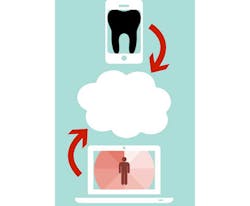Using the cloud to securely increase productivity in dentistry
Imagine an office where you take a patient’s X-rays during his appointment, send them instantly to his oral surgeon across town, send a prescription to a pharmacy with the click of a button, and update his record that immediately syncs across all relevant dentists’ computers, whether in your office or not. Luckily, your imagination only has to stretch so far – the cloud places this and similar scenarios firmly within reach.
Here are a few tips for increasing productivity using the cloud, and the best ways to deploy them securely.
• Maintain control to your files – Through easy syncing, sharing, and storing, the cloud lets you do your work where and when you want. It also makes delegating or reassigning duties simple because granting access to a patient’s file, even when it’s encrypted, requires just a click. With another click, you can prohibit access to sensitive patient files, because best practices mandate that you block access to PHI for former employees. There’s no doubt that being released from the stifling confines of an office makes your life easier, and making smart choices about how you interact with patients and colleagues will undoubtedly increase your productivity. File auditing is another good thing to keep in mind when you’re sharing files and folders. You’ll be able to monitor who edits your files and when.
ALSO BY ASAF CIDON:Are you illegally sharing dental patient data with your colleagues?
But setting up a file-sharing system isn’t enough when PHI is on the line, particularly as dental practices are subject to HIPAA rules. It’s vital to encrypt folders. With a service such as Sookasa, you can seamlessly work with encrypted files, protecting them before they ever reach the cloud. Only you and those you authorize will be able to read the encrypted data. To everyone else they’ll be unintelligible, meaning that even if your cloud service suffers a breach, your patients’ information will remain safe and you won’t be in violation of HIPAA.
• Empower your patients – Patients probably already use the cloud in their everyday lives, so they expect such modern conveniences in their medical care. After all, dental care is about the holistic experience, from booking an appointment to the details of your dentistry expertise, so the benefits are mutually beneficial. Just imagine enabling patients to directly upload updated patient forms and insurance information before they even arrive for their appointments. Similarly, sending and storing their prescriptions, referrals, or reminders is simple. The right solution will ensure that you’re able to provide this convenience on patients’ terms, that is, with no setup or downloads required.
• Manage your workflow by syncing files securely across mobile devices – Cloud-based file-sharing services offer instant synchronization across computers and mobile devices. This means that if a patient contacts you with an emergency or worries about an upcoming procedure while you’re out of the office, you’ll still be able to access her history and other relevant information on your smartphone or tablet. You can also access patients’ files to send to colleagues or other doctors. Not having to call the office or wait until you return saves time, but perhaps more importantly it keeps your patients happy to know you’re responsive whenever they need you.
However, be cautious when syncing files across devices. One of the cloud’s best benefits also presents its greatest risks. That’s because file sync causes files to proliferate and reside on devices unprotected, unless you’ve added file-level encryption. Unfortunately, that is not the default for most file sync and share solutions. Become familiar with what your file-sharing service offers, and you’ll be able to do mobile work with confidence.
The bottom line is that employing the cloud can make your practice an easier and more productive place to work, and it’s easier than ever to make the cloud safe. Making sure your patients’ files are properly encrypted, stored, and shared takes a few minutes, but you’ll feel the positive impact on your work for a long time.



